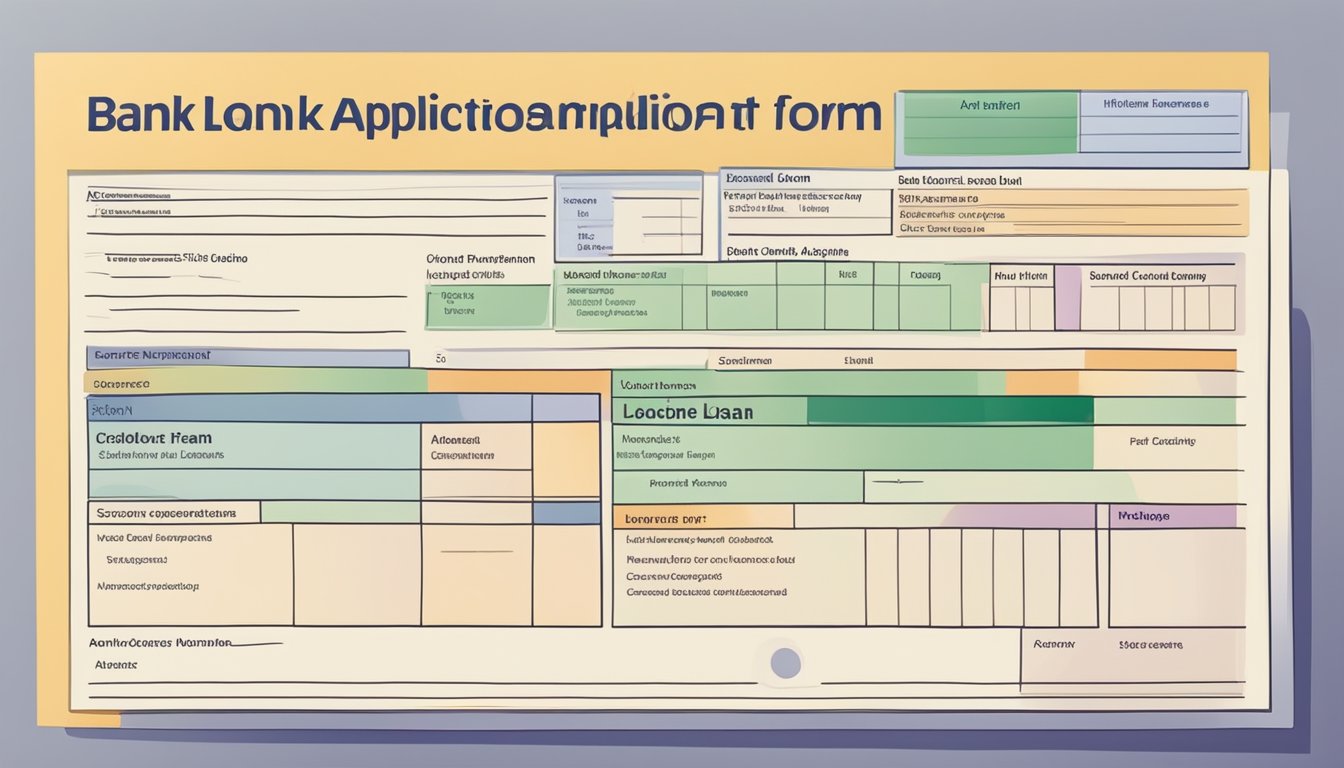If you’re considering taking out a bank loan in Singapore, it’s important to understand the eligibility criteria to increase your chances of approval. Banks in Singapore have specific requirements for loan applicants, including factors such as income level, credit history, and existing debt. Understanding these criteria can help you determine whether you’re eligible for a loan and how much you can borrow.

When it comes to bank loan eligibility in Singapore, your credit score plays a significant role. A higher credit score indicates that you’re a reliable borrower, and banks are more likely to approve your loan application. Additionally, banks will also consider your income level and existing debt when determining your eligibility. It’s important to note that different banks have different eligibility criteria, so it’s worth doing your research to find the best loan options for your financial situation.
If you’re planning to apply for a bank loan in Singapore, there are several factors to consider to increase your chances of approval. By understanding the eligibility criteria and the loan application process, you can make informed decisions and maximise your loan options. With the right approach, you can secure the funding you need to achieve your financial goals.
Key Takeaways
- Understanding the eligibility criteria for bank loans in Singapore is crucial for increasing your chances of approval.
- Your credit score, income level, and existing debt are important factors that banks consider when determining your eligibility.
- Doing your research and understanding the loan application process can help you maximise your loan options and secure the funding you need.
Understanding Bank Loan Eligibility in Singapore

If you are considering taking out a bank loan in Singapore, it is important to understand the eligibility criteria that banks use to determine whether or not you are eligible. In this section, we will discuss the key eligibility criteria and the importance of credit history.
Key Eligibility Criteria
When applying for a bank loan in Singapore, there are several key eligibility criteria that you must meet. These include:
- Age: You must be at least 21 years old to apply for a bank loan in Singapore.
- Income: You must have a stable source of income to demonstrate your ability to repay the loan.
- Credit Score: Banks will check your credit score to determine your creditworthiness and ability to repay the loan.
- Total Debt Servicing Ratio (TDSR): This is the percentage of your income that is used to service your existing debts. Banks will use this to determine whether you can afford to take on additional debt.
- Citizenship: Singapore citizens and Permanent Residents have a higher chance of being approved for a bank loan than foreigners.
Importance of Credit History
Your credit history is an important factor that banks consider when determining your eligibility for a bank loan in Singapore. Your credit history shows how well you have managed your debts in the past, and banks use this information to determine your creditworthiness.
If you have a good credit history, you are more likely to be approved for a bank loan and may be eligible for lower interest rates and better loan terms. On the other hand, if you have a poor credit history, you may be denied a loan or may be eligible for higher interest rates and less favourable loan terms.
In summary, understanding the key eligibility criteria and the importance of credit history is crucial when applying for a bank loan in Singapore. By ensuring that you meet the eligibility criteria and have a good credit history, you can increase your chances of being approved for a loan and may be eligible for better loan terms.
Types of Bank Loans Available

When it comes to borrowing money from a bank, there are several types of loans available to you. Each loan type has its own unique features, benefits, and drawbacks. In this section, we will explore the three most common types of bank loans available in Singapore.
Home Loans and HDB Flats
If you are looking to buy a property in Singapore, a home loan is the most common type of loan you will need. Home loans are designed to help you finance the purchase of a house, flat, or other residential property.
In Singapore, the Housing Development Board (HDB) is responsible for providing affordable public housing to Singaporeans. If you are a Singaporean citizen or permanent resident, you may be eligible for an HDB loan to finance the purchase of an HDB flat. HDB loans are available at a fixed interest rate and can be repaid over a period of up to 25 years.
Private property buyers can also take out a home loan from a bank. Home loans for private properties are available at both fixed and variable interest rates. The loan amount you can borrow will depend on your income, credit score, and the value of the property you are purchasing.
Personal Loans and Credit Cards
Personal loans are unsecured loans that can be used for a wide range of purposes. They are typically used to finance large purchases, such as home renovations, weddings, or medical expenses. Personal loans are available at both fixed and variable interest rates and can be repaid over a period of up to 5 years.
Credit cards are another type of loan available in Singapore. They are a form of revolving credit, which means that you can borrow money up to a certain credit limit whenever you need it. Credit cards come with a range of features and benefits, such as cashback rewards, air miles, and discounts on dining and shopping.
Car Loans for Vehicles
If you are looking to buy a car in Singapore, a car loan is the most common type of loan you will need. Car loans are available at both fixed and variable interest rates and can be repaid over a period of up to 7 years.
The loan amount you can borrow will depend on the value of the car you are purchasing and your income. Some banks may also require you to make a down payment of up to 30% of the car’s value.
In conclusion, there are several types of bank loans available in Singapore, each with its own unique features and benefits. Whether you are looking to buy a home, finance a large purchase, or buy a car, there is a loan available to meet your needs.
Financial Factors Affecting Loan Approval

When applying for a bank loan in Singapore, there are several financial factors that can affect your loan approval. Here are some of the most important factors to consider.
Income and Employment Stability
One of the most important factors that banks consider when assessing your loan eligibility is your income and employment stability. Banks want to be sure that you have a steady source of income and that you are likely to continue earning that income in the future.
If you are a salaried employee, you will need to provide proof of your income, such as your latest payslips or your income tax statements. Your gross monthly income will be used to calculate your loan eligibility. If you are self-employed, you will need to provide your latest income tax statements and other relevant documents to prove your income.
Debt-to-Income Ratios
Another important factor that banks consider when assessing your loan eligibility is your debt-to-income ratio (DTI). Your DTI is the ratio of your monthly debt payments to your gross monthly income.
The Monetary Authority of Singapore (MAS) has set a maximum total debt servicing ratio (TDSR) of 60% for all credit facilities purchasing or refinancing of property. This means that your total monthly debt payments, including your new loan instalment, cannot exceed 60% of your gross monthly income.
Loan-to-Value Ratios
The loan-to-value (LTV) ratio is another important factor that banks consider when assessing your loan eligibility. The LTV ratio is the ratio of your loan amount to the value of the property you are purchasing or refinancing.
The MAS has set a maximum mortgage servicing ratio (MSR) of 30% for HDB flats and 35% for private properties. This means that your monthly loan instalment cannot exceed 30% or 35% of your gross monthly income, depending on the type of property you are purchasing or refinancing.
In conclusion, when applying for a bank loan in Singapore, it is important to consider your income and employment stability, your debt-to-income ratio, and your loan-to-value ratio. By understanding these financial factors, you can increase your chances of getting your loan approved and make informed decisions about your finances.
Loan Application Process

When applying for a bank loan in Singapore, there are a few things you need to keep in mind to ensure a smooth application process. This section will guide you through the documentation required and the approval timeline.
Documentation Required
To apply for a loan, you will need to provide some basic documentation. These include your NRIC, income tax notice of assessment, and computerised payslip. You may also need to provide additional documents depending on the type of loan you are applying for.
For example, if you are applying for a personal loan, you may need to provide proof of income, such as your latest payslip or bank statement. If you are self-employed, you may need to provide your business registration documents and financial statements.
Understanding the Approval Timeline
Once you have submitted your loan application, the bank will review your documents and assess your eligibility. This process typically takes a few days to a week, depending on the bank and the type of loan you are applying for.
If your application is approved, the bank will provide you with a loan offer, which will include details such as the interest rate, processing fee, and instalment amount. You will need to review the offer carefully and accept it if you are satisfied with the terms.
To accept the loan offer, you will need to sign the loan agreement and provide any additional documentation requested by the bank. Once the bank has received all the necessary documents, the loan amount will be disbursed to your bank account.
To make the loan application process faster and more convenient, you can use SingPass or MyInfo to autofill your personal and income details. This will save you time and ensure that your application is processed more quickly.
In summary, applying for a bank loan in Singapore is a straightforward process, but it does require some documentation and patience. By understanding the documentation required and the approval timeline, you can ensure that your loan application is processed smoothly and efficiently.
Maximising Your Loan Options

When it comes to bank loan eligibility in Singapore, there are several factors to consider. However, once you have determined your eligibility, it is important to explore the various loan options available to you. This section will explore how to maximise your loan options by exploring flexibility and terms, as well as the benefits of comparing different banks.
Exploring Flexibility and Terms
One of the most important factors to consider when looking for a bank loan is flexibility. Some banks offer more flexible terms than others, which can be a major advantage for borrowers. For example, some banks allow you to choose the loan tenure and instalments that work best for you, while others may offer cashback or other incentives.
Another important factor to consider is the interest rate. While it is important to find a low interest rate, it is also important to consider the effective interest rate (EIR). The EIR takes into account the loan tenure and any other fees associated with the loan, giving you a more accurate picture of the total cost of the loan.
Benefits of Comparing Different Banks
Comparing different banks is essential when it comes to maximising your loan options. Each bank has its own set of terms and conditions, and some may be more favourable than others. By comparing different banks, you can find the best loan options that meet your needs.
In addition to interest rates and EIR, you should also consider other factors such as the loan tenor, annual income requirements, and credit limit. Some banks may also offer instant approval and disbursement, which can be a major advantage if you need the funds quickly.
Refinancing is another option to consider if you already have an existing loan. By refinancing, you can potentially lower your monthly instalments or even reduce your principal. However, it is important to carefully consider the terms and fees associated with refinancing before making a decision.
Overall, maximising your loan options requires careful consideration of the various factors involved. By exploring flexibility and terms, and comparing different banks, you can find the best loan options that meet your needs.
Frequently Asked Questions

How can one determine their qualification for a bank loan in this vibrant city?
To determine your eligibility for a bank loan in Singapore, you need to meet certain criteria, such as your income, age, and credit history. Banks also take into account the type of property you want to purchase and the loan amount you are requesting. You can use online calculators or speak to a financial advisor to get an estimate of your eligibility.
What’s the maximum amount I could possibly borrow for a property loan, I wonder?
The maximum amount you can borrow for a property loan in Singapore depends on your financial situation and the bank’s lending criteria. Generally, banks will lend up to 75% of the property value, but this may vary depending on the bank and the type of property you’re purchasing.
Could you enlighten me on the process for foreigners to secure a bank loan in Singapore?
Foreigners can secure a bank loan in Singapore, but the process may be more challenging than for locals. You will need to provide additional documentation, such as proof of income and a valid work permit or employment pass. You may also need to have a higher down payment or a local guarantor.
What’s the upper age limit for securing a loan in our bustling financial hub?
There is no upper age limit for securing a loan in Singapore, but banks may consider your age when assessing your eligibility. They may also require you to have a shorter loan tenure or a higher down payment if you are older.
Could you explain the Total Debt Servicing Ratio (TDSR) and its impact on loan eligibility here?
The Total Debt Servicing Ratio (TDSR) is a measure of your ability to repay your debts. It takes into account all your existing debts and your income to determine how much you can afford to borrow. The TDSR limit is set at 60% of your gross monthly income. If your TDSR is too high, you may not be eligible for a loan.
Is there a minimum threshold for home loans in our splendid Singapore?
There is no minimum threshold for home loans in Singapore, but banks may have their own minimum loan amount requirements. You can check with individual banks to find out their specific requirements.
Remember, when applying for a bank loan, it’s important to do your research and understand the eligibility criteria and the terms and conditions of the loan. With the right preparation and guidance, you can increase your chances of securing a loan and achieving your financial goals.




